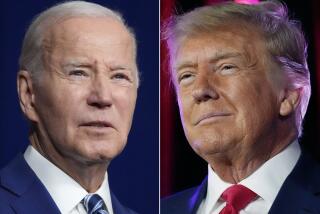Timing Puts Pregnant Foe at Disadvantage : Zia Sets Pakistan Election for November
- Share via
ISLAMABAD, Pakistan — President Zia ul-Haq pledged Wednesday to have “free, just and impartial” elections in Pakistan on Nov. 16, ending widespread fear that he would defy the constitution and postpone elections indefinitely, as he did after the 1977 coup that brought him to power.
But in setting the elections for Nov. 16, Zia put his principal political foe, Benazir Bhutto, at a distinct disadvantage. She is expected to deliver her first child in mid-November, and she conceded in an interview this week that campaigning in the late months of pregnancy would be difficult.
Zia, who on May 29 dissolved the elected national government, is required by the constitution he helped write to call legislative elections before Aug. 27. But he said Wednesday that the November date is justified by the weather and religious holidays.
Gives Reasons for Delay
If the elections were held on schedule in August, “most of the country would be under floods, and it would be very hot and humid in other areas,” the president told the advisory upper house of the Federal Legislature, the one institution still intact after Zia’s May purge.
Moreover, he said, August is the Islamic month of Moharram, the time when Muslims of the Shia sect commemorate the death of the Prophet Mohammed’s grandson. The Shias are a minority among Pakistan’s 95 million Muslims, and communal violence erupts occasionally during Moharram.
“Everybody knows the emotions in those days,” Zia said, “and holding elections at that time could create bad situations.”
He said that about 80,000 other Pakistani Muslims would not be able to take part in an earlier campaign because they are in Mecca for the annual Muslim pilgrimage known as the hajj.
Parties’ Roles Uncertain
He said the elections will be “a landmark in the history of this nation,” but he did not specify whether candidates will be permitted to campaign under their party banners. Some political analysts believe that this would give Bhutto and her Pakistan People’s Party an advantage over the Pakistan Muslim League that Zia has been trying to organize.
Bhutto indicated this week that she and her followers will take part in the campaign even if they are not permitted to use their party symbol--a peasant farmer with an ox-drawn plow.
Some of her advisers suggested privately that delaying the election beyond August would give the opposition time to further improve its organization, but most said nevertheless that November would be a bad month for the opposition.
Bhutto and several other opposition leaders reacted to Zia’s speech with skepticism. In a written statement from Karachi, Bhutto called the delay in the polls a “subversion” of the constitution. And, noting that Zia twice had set dates for elections in the late 1970s that he later canceled, the leader of the largest fundamentalist Islamic party, Qazi Hussain Ahmed, said: “The people should be vigilant. There is every possibility that a conspiracy will be hatched and elections postponed.”
Several bureaucrats said Zia seemed to be implying that the parties will be allowed to participate--for the first time in 18 years--but other analysts said the issue remains unresolved.
Plays It Close
“This is the style of Zia,” a diplomat said, “playing it close to his chest and letting it out bit by bit, just as much as he has to.”
The diplomat said the announcement of an election date is likely to please the Reagan Administration and the U.S. Congress, which has provided Pakistan with more than $3 billion in aid over the past six years.
Many congressmen, led by Rep. Stephen J. Solarz (D-N.Y.), criticized Zia in May after he dissolved the lower house of the legislature. And the State Department has clearly been pressuring Zia to order elections.
“We have made unmistakably clear our support for democracy in Pakistan,” Deputy Assistant Secretary of State Howard B. Schaffer said in a congressional appearance in June. “President Zia has been made fully aware that a return to martial law or a failure to hold free and fair elections in accordance with the constitution of Pakistan would have a severely detrimental effect on U.S.-Pakistan relations.”
U.S. Concerned
Also, there is deepening concern in Washington over Pakistan’s exports of heroin and reports that Zia is developing nuclear weapons.
Bhutto, who emerged as the opposition’s leader after the overthrow and execution of her father, Prime Minister Zulfikar Ali Bhutto, was not available for comment on Zia’s decision. But she said Monday that her absence from the campaign in November would not severely affect her party’s chances.
She said that her mother, who has been in exile in Paris since 1982, is planning to run for the legislature and that the mother is likely to draw crowds as large as those that have turned out for the daughter.
More to Read
Sign up for Essential California
The most important California stories and recommendations in your inbox every morning.
You may occasionally receive promotional content from the Los Angeles Times.










